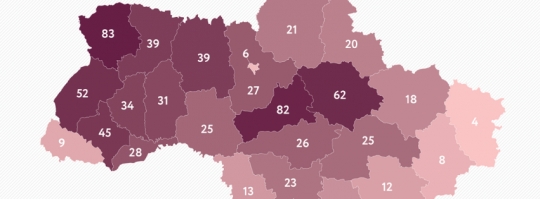The budget administrative resource, which consists in using budget funds and means in favor of individual parties and candidates, is one of the most dangerous breaches of the electoral process standards. After all, the abuse of such a kind of administrative resource often occurs without any breach of the formal requirements of the law, but it has devastating consequences for the competitiveness of the election. Politicians manipulate the interests of voters and local communities to get the appropriate level of funding for local projects, avoiding public responsibility for de facto running the election campaign billed to taxpayers and the budget. Already, large-scale coverage of big areas with small socio-economic projects allows the current MP's and their parties to gain certain potential electoral advantages at the upcoming elections, on the one hand, but on the other hand, it makes it impossible to achieve long-term, and most importantly, sustainable effect from state programs and activities.
In 2019, Ukraine is facing a resonant election of the President and the Verkhovna Rada. In this respect, it is very important to ensure genuinely competitive elections, guaranteeing each candidate equal rights and opportunities in the electoral process.
To this end, the long-term observers of the Civil Network OPORA began monitoring of activities that may be related to the use of budget resources for indirect campaigning.
Subject and characteristics of monitoring
Within the scope of the study, OPORA monitored and tracked probable cases of using budgetary resources by MP's and political parties for early indirect campaigning. In particular, the subject of the study was a subvention for the socio-economic development of certain territories, funds of the State Fund for Regional Development, and the Road Fund, as well as other budget-funded programs and resources.
However, due to the incomplete and non-transparent mechanisms for allocating budget resources, the politicization and secrecy of the process, as well as the direct involvement of people's deputies in the allocation of funds, the main subject of monitoring was Subvention for the social and economic development of individual territories.
Thus, in 2017, at the Ministry of Finance, they established a special Commission to draft proposals for the allocation of the subvention. Pursuant to the Resolution o the Cabinet of Ministers of Ukraine No 106, it shall include the members of the Budgeting Committee, upon the decision of the abovementioned Committee (at least 50% of members of such commission) and the representatives of the Ministry of Finance. Currently, the Commission includes 16 members: 14 people’s deputies and 2 representatives if the Ministry of Finance. Therefore, the people’s deputies enjoy the absolute majority in the Commission membership, which might affect the drafting of proposals for the distribution of subventions. It is even more relevant due to the fact that the Commission adopts decisions by the majority vote of the attending members, but not of the total number of members.
As regards the party representation, most MPs engaged in the Commission come from the “Petro Poroshenko Block” (7 persons). “People’s Front”, that also belongs to the coalition, has 3 representatives among the Commission members. There is one representative for each for the Radical Party, for the OUU “Batkivshchyna”, for the “Will of the People” group, and for the non-faction group. “Opposition Block,” “Self-Reliance,” or “Revival Party” groups have no representatives among the Commission members.
In the view of OPORA, the work of the Commission is not transparent enough. For instance, there is no openly accessible information about the personal membership, there are no minutes of the meetings available (OPORA managed to receive them only after a series of requests for information). No information about the time and venue for the meetings is announced.
Subvention is a form of cash aid to the local authorities coming from the state to reach a specific objective. Each such monetary aid is included in the State Budget of Ukraine, but the amount and the list of state subventions can be changed from year to year. The budget usually provides for the following types of subventions:
- medical;
- educational;
- for the establishment of infrastructure of amalgamated hromadas;
- to cover the spread over of the actual cost of public utility services provided to the population;
- for the implementation of activities focusing on the development of the system of health care in rural areas;
- to implement activities for social and economic development of individual territories;
- to provide a high-quality, modern, and affordable general secondary education "New Ukrainian School".
In addition, there is the State Fund for Regional Development (SFRD), which is also actively used to get the resources for local needs.
Thus, in 2016 and 2017, within the framework of subvention for social and economic development, the Cabinet of Ministers allocated nearly UAH 8 billion. This year, the Ukrainian government has allocated another UAH 3 billion for the development of territories. Meanwhile, another UAH 2 billion still remains undistributed. However, was it successful to achieve sustainable, efficient and, most importantly, balanced development of regions through these funds?
According to the findings of the preliminary surveys by the Civil Network OPORA, the mechanism of state subventions is increasingly more often becoming a way of interaction between politicians and local communities, when a large number of voters is involved in numerous but not costly projects. The scatteration of funding for dozens, or even hundreds of non-systemic or rather petty costs, virtually eliminates the quality effect from state subsidies. While in 2016, 13% of state-financed objects were less than UAH 50,000, then, in the past year, there were already 26% of such projects. Already this year, as stipulated by the resolution of the Cabinet of Ministers of June 13, No. 423-p, there are also about 23% of such projects. Lack of planning, and of justified priorities or clear criteria for project evaluation is hardly compatible with the principles of sustainable development of the regions, but it is fully in line with the logics of struggling for the favour of voters.
Thus, in order to prevent the use of budgetary resources by people's deputies and political parties intending to gain electoral advantages, OPORA observers started special monitoring. The object of the monitoring was the public activity of political actors, which may be related to the use of budget funds for indirect campaigning.
As part of our monitoring, we used the following ways to collect information:
- Personal visits to public events in the regions.
- Analysis of official pages / sites of people's deputies and parliamentary parties.
- Monitoring of content of local mass media, including TV channels.
- Analysis of sites / official pages of local self-government bodies and their officials.
- Monitoring of political advertising materials, reports of people's deputies, etc.
The first phase of the study was conducted in June-October, 2018, in all regions of Ukraine, to cover all 198 constituencies.
Forms and types of using budget resources
In the period from June to October, 2018, observers of the Civil Network OPORA recorded 748 cases of Allegeduse of infrastructure projects and socio-economic activities for indirect campaigning in favor of people's deputies of Ukraine and / or political parties. In 75% (560) of the recorded cases therefor, a subvention for the socio-economic development of the territories might have been used. In 7% (52) - The Road Fund was used; and the 2% (17) of cases refer to the State Fund for Regional Development. Instead, 16% (119) more cases intending to obtain potential electoral benefits used budgetary funds, which affiliation failed to be finally established, and, to a lesser extent, they also used medical or educational state programs.
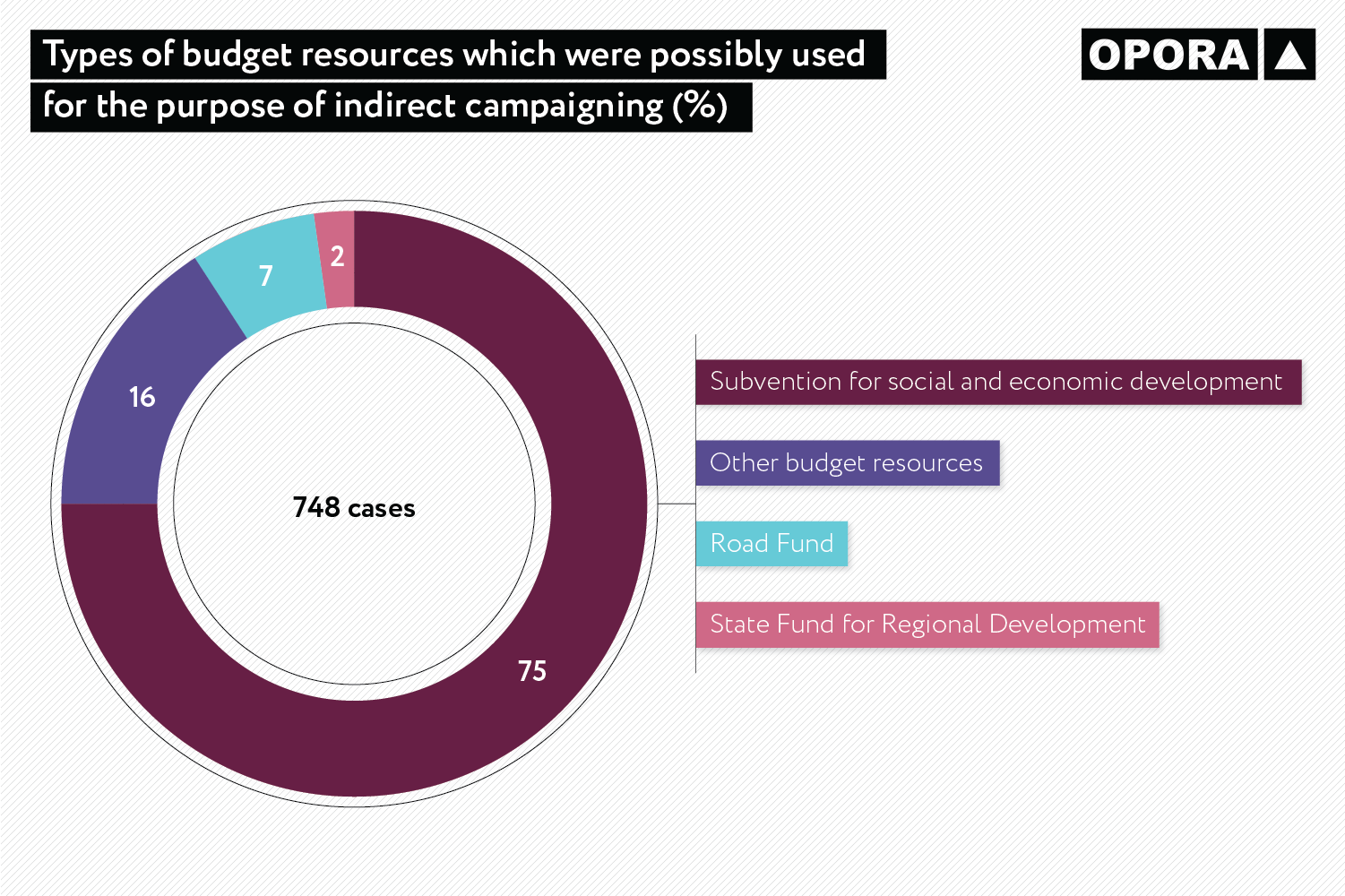
According to the monitoring findings, indirect early campaigning was carried out mostly by the people's elected representatives - 69% (512) cases; in 12% (92) of recorded cases - MP's assistants were engaged, in 8% (59) - the media, in 7% (53) - local self-government and state authorities or their officials, and in 4% (32) - representatives of political parties.
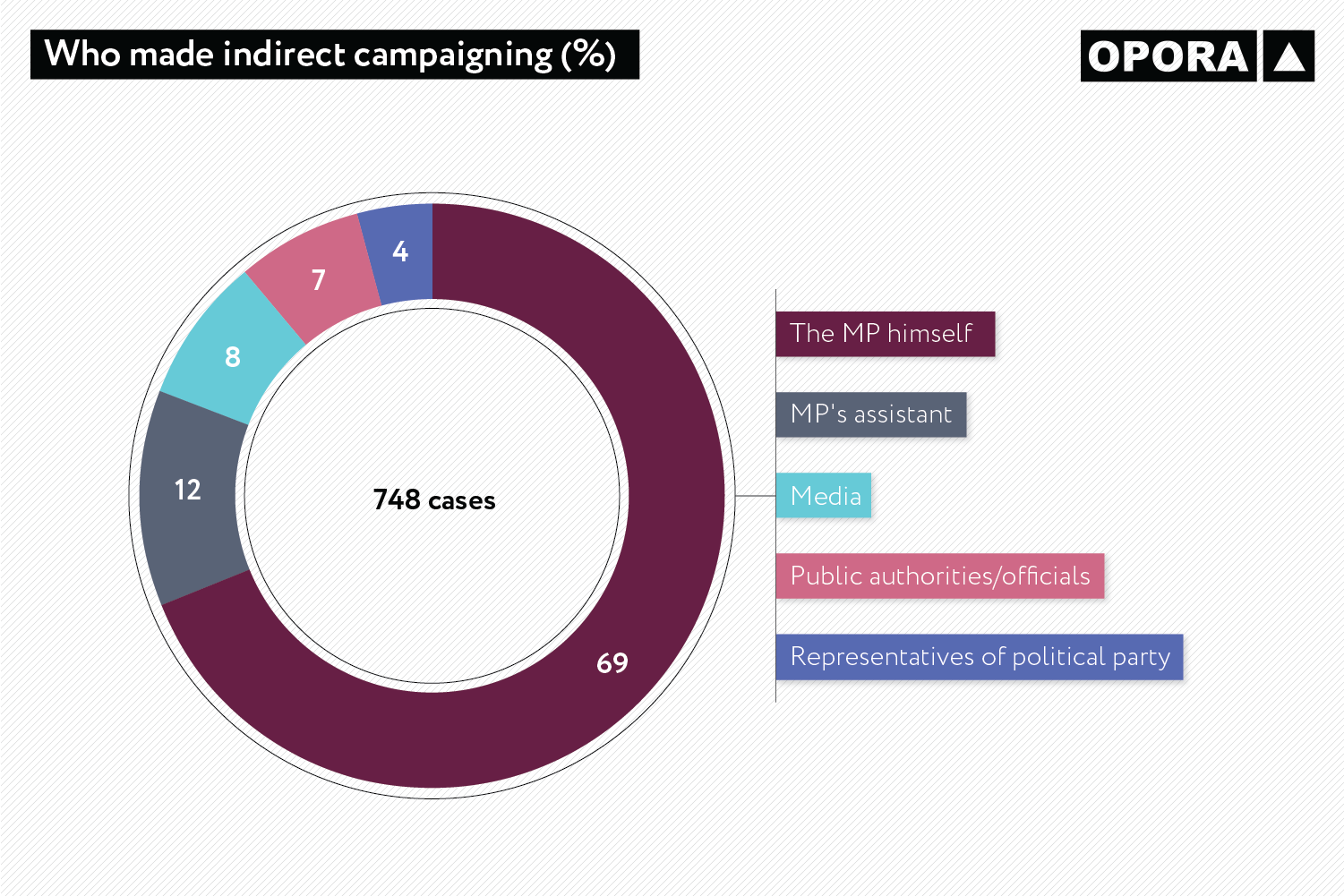
In general, one could identify two main types of the possible use of budget resources for indirect campaigning: public events - 49% (364), and media / social media activity - 44% (331). A few cases are also related to the official Internet sites of the authorities or the public profiles of their officials - 7% (53).
Indirect campaigning during public events with alleged use of budget resources.Usually, such activity is associated with participation in the opening ceremonies of newly constructed or reconstructed infrastructure objects (schools, kindergartens, playgrounds, sports facilities, first aid stations, etc.), with the transfer of procured equipment or machinery (furniture sets, multimedia and hardware, musical equipment, etc.), or with inspection of the running state of works. As mentioned above, in most cases (75%), such activities must have been funded through subventions for the socio-economic development of individual territories. The Civil Network OPORA generally recorded 364 cases of this form of public activity in the period from June to October, 2018.
Thus, Majoritarian deputy Oleksandr Zholobetskyi ("Petro Poroshenko Block"), on September, 11, visited a secondary school in the village Shevchenkove, in Mykolayiv oblast. The parliamentarian personally handed over a smart TV and a microscope for the chemistry class. On the Internet, the MP noted that the gifts were purchased at the expense of the state subvention for social and economic development, "which he attracted to the district."
In turn, on June, 10, a children's playground was opened in the village of Makhnivtsi, Lviv oblast. The event was attended by representatives of local authorities, and priests of the local church who consecrated the playground, and thanked to the people's deputy Taras Batenko (non-factional) for facilitating the allocation of funds for its construction. for contributing to raising funds for its construction. Later, a post about this event was published on the portal Zolochiv.Net. In particular, it stated that in 2017, in Zolochiv rayon, funds were allocated for the installation of 52 children's playgrounds and sports grounds in the amount of 2 million 158 thousand hryvnias, at the expense of the state budget funds, upon request of the People's Deputy Taras Batenko.
On the other hand, on June, 1, the majoritarian deputy from the Cherkasy oblast Serhiy Rudyk attended the celebration of the 45th anniversary of the Vinochok kindergarten. Subsequently, on Facebook, the deputy shared the impressions from the event, and noted that a number of changes in the kindergarten took place with his support. “It is symbolical that today, on the International Children's Day, we celebrate the 45th anniversary of the Vinochok kindergarten, which is located in Kosar, Kamyanka rayon. Now, it seems to be a very difficult task to surprise the staff of the kindergarten. Because, the windows were replaced, in several steps, not without my involvement, a modern playground was installed, and the staff of the institution was awarded with the Certificate of Merit of the Verkhovna Rada of Ukraine, which I personally handed to the director of the kindergarten Olena Beznis!” - wrote the people's deputy.
Usually, during such public events, it is stressed that the funds for the implementation of a particular project were attracted "with support of", "initiated by" or "as facilitated by" some MPs. In some cases, the MP himself may emphasize this, while in others, the fact would be mentioned by his team members, representatives of local authorities, or heads of institutions to which the funding was allocated. It should be noted that according to the monitoring findings, the vast majority of cases of indirect early campaigning during public events took place in September - 133 (37%)
Indirect campaigning in social networks and the media with the alleged use of budget resources.This form of activity is usually expressed in several forms.Firstly, people's deputies and / or members of their teams published on their profiles in social media the information on the budget funds raised with the support of the parliamentarian, to implement a particular project. Secondly, these are also reports in the media, where the emphasis is placed on the fact that funds for a particular infrastructure object were involved with the assistance of the people's deputy. Thirdly, these are the so-called "Letters of Acknowledgement" usually published on the sites of local Internet resources from grateful voters or employees of budget institutions, for the development of which the budget funds were attracted with the assistance of the MP.
Thus, on September, 6, in the "Pozytsiya" newspaper, a news report was published about the celebration of the day of knowledge in one of Zaporizhzhya schools. In particular, it stated that during the festive line-up, the deputy of the Zaporizhzhya City Council Serhiy Lotsman, on behalf of the people's deputy Vyacheslav Boguslaev ("The Will of the People" group) presented a gift certificate for the purchase of an interactive system, which included a laptop, a projector, and an interactive board. It is also mentioned in the coverage that 23 educational institutions of the Shevchenkivskyi district of Zaporizhzhya received from Vyacheslav Boguslaev, and from the deputies of the regional and city councils from the "New Politics" party the same interactive complexes as gifts for the Day of Knowledge. It should be noted that the purchase must have been done for the subvention of UAH 1.7 million allocated from the state budget. Local media also reported about it.
Another interesting coverage was published on September, 8, on the portal of the Cherkasy outlet "Nova Doba" on behalf of Natalia Symonenko, the chairperson of the Commission of Korsun-Shevchenkivskti City Council for Social Economic Development, Budget Planning, and Finance. In particular, the articles stated that a people's deputy from district 196 Gennady Bobov (the "Revival Party") attracted over 33 million hryvnias from various sources for the development of the city during the last three years. The report lists the facilities for which the deputy attracted budget funds. It should be noted that during the monitoring period, another 8 such materials were published in the outlet. The MP was acknowledged by the voters, by the medical assistant, by the secretary of the village council, a.o.
In general, the OPORA observers recorded 331 cases of indirect early campaign of this type. It was most intense in July - 28% of the total number of events recorded.
Indirect campaigning with alleged use of budget resources engaging state authorities and their officials. Usually, such activity is manifested in two forms.In some cases, officials participate in public events at the opening ceremonies / inspection of facilities, which involved funds from state subsidies, during which they emphasize that the funds for the implementation of the event were attracted due to the "initiative" or "support" of the people's deputy. Instead, other cases include the publication of materials on the sites of local authorities that also emphasize the exclusive role of certain MP in raising budget funds for the infrastructure object.
Thus, on October, 26, a people's deputy from Ternopil region Taras Yuryk ("Petro Poroshenko Bloc") took part in the opening of the Department of anesthesiology and intensive care unit with an operation ward in the town of Pidhaytsi, Ternopil oblast. During this event, the deputy himself had a speech, as well as the head of the Rayon State Administration Anna Kolodnitskaya, who stated that this project was implemented with the support of Taras Yuryk.
Instead, in October, the website of Oleshky City Council of Kherson Oblast informed about the reconstruction of the "Start" city stadium. The report stated that "great merit in this belonged to the people's deputy of Ukraine Mykola Palamarchuk ("Petro PoroshenkoBlock” - ed. OPORA), who has patronized the stadium for many years»
In general, during June – October, it was fixed 53 cases of such an indirect form of early campaigning. However, it should be noted that according to OPORA’s estimates, about 30% of cases of indirect campaigning took place in the formal presence of officials of various levels. For that matter, the OPORA Civil Network again draws the attention of authority officials of all levels to the need for strict observance of the requirements of the current legislation and international standards during the elections. The International Code of Conduct for Public Officials adopted by the United Nations General Assembly in 1996, points to the peculiar requirements for public officials in the context of their engagement in the political process. This activity shall be carried out in accordance with the laws and administrative regulations, so as not to undermine the public trust for their impartial performance of functions and duties. Public officials shall have no right to use the funds, property, services, or information to conduct activities not related to their official duties performance. The Document of the Copenhagen Meeting of the Conference on Human Dimension of the CSCE requires from the member states to observe a “strict distinguishing between the state and political parties, particularly, that political parties would not be merging with the state.”
Indirect campaigning using manipulation technologies.The Civil Network OPORA identified a number of cases with signs of using unfair technology by people's deputies, members of their teams, or political parties. In some cases, budget resources were asserted either as own funds or funds of the deputy’s fund. During these public events, MPS or members of their teams present gift certificates for purchase of equipment for budgetary institutions, but "forget" to mention that it had been probably purchased for the state budget funds, not their own.
Thus, on June, 16, Oksana Slobodzian, the assistant of the People’s deputy Vasyl Yanitskyi (Petro Poroshenko Block), mentioned on her Facebook profile that “the community center in Zelena was repaired at the expense of the money allocated by the people’s deputy from his fund.” However, it should be noted that in 2017, the funds for repairs were planned in the subvention for social and economic development, in a total amount of UAH 113,000.
On June, 28, a deputy Olexandr Koloda ("People's Front") during the cycling race in the city of Nizhyn, Chernihiv oblast, on the occasion of the Constitution Day, handed certificates for the purchase of 23 bicycles for the Nizhyn Comprehensive Sports School for Children and Youth. In order to purchase these bikes, the subvention funds for social and economic development in 2018 were provisioned, in the amount of UAH 190,000.
In turn, on September, 27, on the official Facebook page, the People's Deputy Peter Yurchyshyn ("Petro Poroshenko Block") posted greetings on the occasion of the All-Ukrainian Library Day. “I congratulated everyone related to the library activities, and celebrated leading librarians of the region with the respective Certificates of Acknowledgement, and also presented from my Yurchyshyn family a certificate for UAH 10,000 to Kumanivtsi village library to purchase the photo camera,” – the post says. However, for the acquisition of a camera for this library, a subvention of 2018 was provided for UAH 10,000.
As of today, OPORA observers registered few cases that may have signs of using unfair practices. However, to ensure equal rights, conditions, and opportunities for 2019 national election, it is extremely important for all candidates to strictly observe acting law and prevent the use of budget resources for the sake of electoral advantage.
Scale of distribution, party component, and subject areas
Geography of Distribution
The Civil Network OPORA recorded instances of indirect campaigning with the alleged use of budget resources in all regions of Ukraine. Most of such cases were discovered by OPORA observers in Volhynia (83), Cherkassy (82), Poltava (62), Lviv (52), and Ivano-Frankivsk (45) areas. Instead, the smallest number of such cases was recorded in Transcarpathia (9), Donetsk oblast (8), in Kiev (6), and in Luhansk oblast (4).
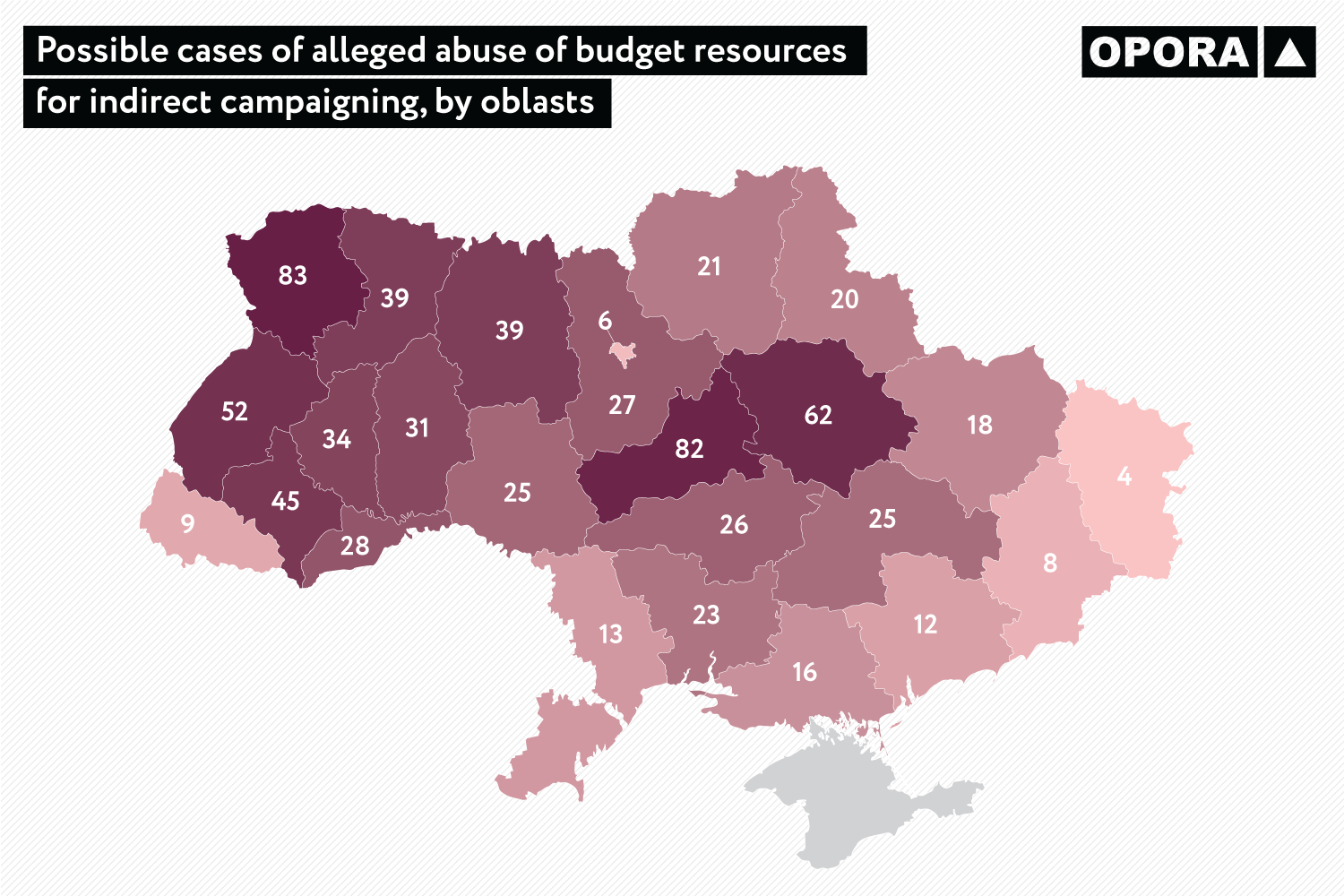
Most cases of indirect campaigning were targeting villages - 52%, and less frequently they referred to cities - 36%, and townships - only 12% cases. In total, according to OPORA’s estimates, 645 various places in all regions of Ukraine were engaged therefor (one case could refer to several settlements).
It is worth noting that cases of indirect campaigning with possible involvement of budgetary resources are recorded in relation to 114 majoritarian deputies, and 17 parliamentarians, elected by party lists. The cases were recorded within 128 constituencies, which makes 65% of the total number or the 71% of those districts that, according to OPORA estimates, receive subventions from the state budget on a regular basis.
Party component
According to the monitoring findings, in the period from June to October, the early indirect campaigning with the alleged use of budget resources was most actively conducted for the benefit of the following elected representatives: Ihor Huz (“People’s Front”, Volhynian oblast) – 60 cases, Kostiantyn Ishcheykin (“Petro Poroshenko Block,” Poltava oblast) – 49, Serhiy Rudyk (“Petro Poroshenko Block,” Cherkasy oblast) – 28, Vasyl Yanitskyi (“Petro Poroshenko Block,” Rivne oblast) – 27, Oles Dovhyi (“Will of the People” group, Kirovohrad oblast) – 23, Viktor Shevchenko (non-faction, Ivano-Frankivsk oblast) – 22, Anton Yatsenko (“Revival Party” group, Cherkasy ooblast) – 21.
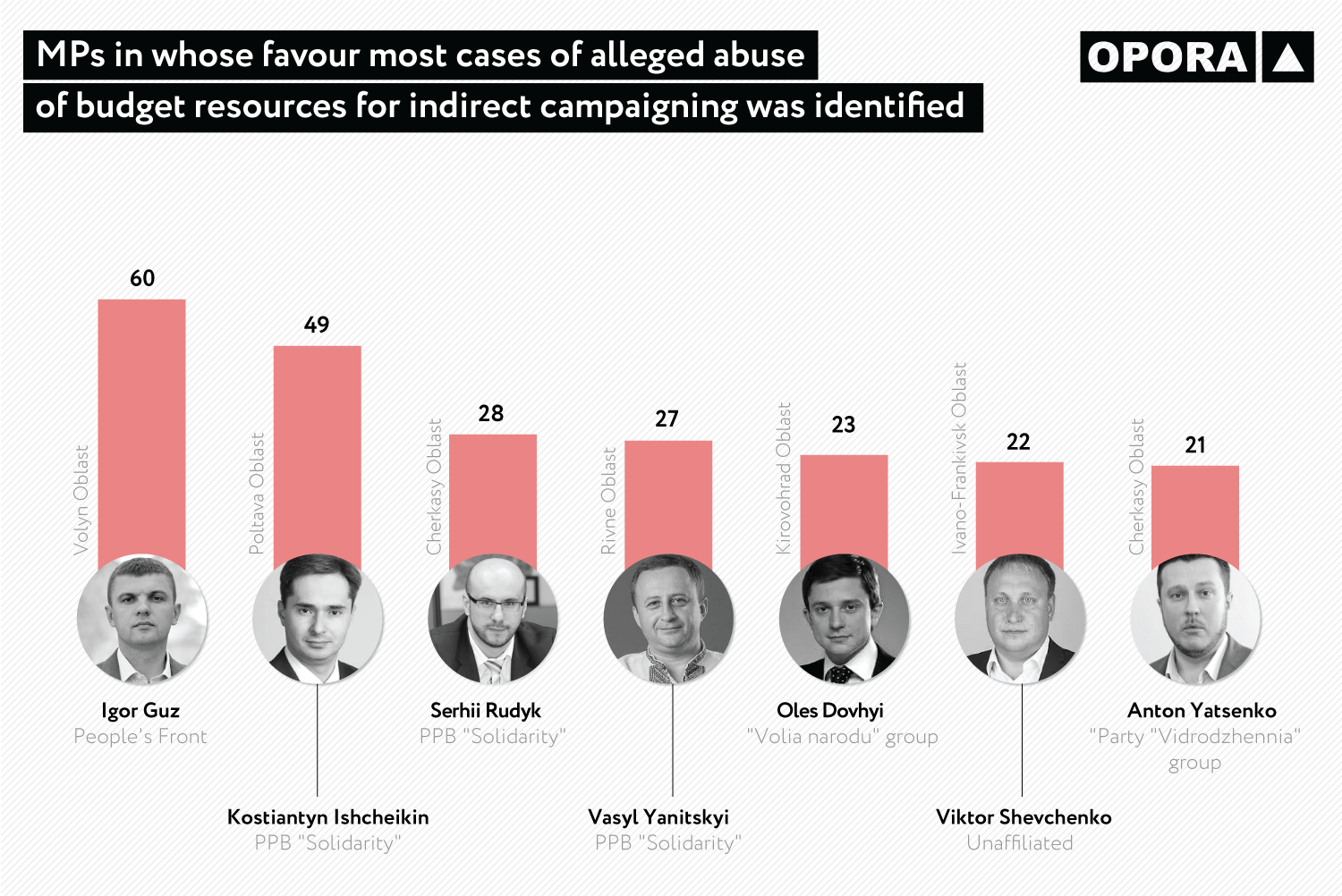
Among the party-list deputies, the highest activity in this context was shown by Khvycha Meparishvili ("People's Front") - 9 cases, and Oleh Lyashko (Radical Party) - 8.
It is worth noting separately that while it is rather typical for the majoritarian deputies to resort to activities that might involve the use of budget funds for indirect campaigning, it seems to be a new practice for the party-list MPs. Thus, OPORA observers recorded cases of activities of Ihor Kononenko ("Petro Poroshenko Block") within the constituency No. 94 in the Kyiv oblast, of Maria Iona ("Petro Poroshenko Block") in the constituency No. 80 in Zaporizhzhya oblast, of Khvycha Meparishvili ("People's Front") in constituency No. 90 in the Kyiv oblast, of Roman Zastavnyi ("People's Front") in constituency No. 163 in Ternopil oblast; of Olexandr Gorbunov ("People's Front") in the city of Kirovohrad, etc.
The research findings show that such activities of the party list MP’s make up 6% of all cases recorded by OPORA observers. Those are the case that might have signs for using budget resources for indirect campaigning.
During the monitoring period, OPORA observers took record of cases of the alleged use of budgetary resources for indirect campaigning among representatives of all parliamentary factions and Deputy groups, except for "Self-Reliance” Union.
The largest number of such activities was recorded in terms of the people's deputies who are members of the Petro Poroshenko Block - 372 cases; and of the "People's Front" – 142 cases. The non-faction deputies account for 89 cases, people's deputies from the "Will of the People" group - 78, and members of the "Revival Party" group – 60 cases. In turn, less than 10 cases of using budget funds for indirect campaigning were recorded for the deputies who are members of Oleh Liashko Radical Party (8), OUU “Batkivshchyna” (6), and the “Opposition Block” (2).
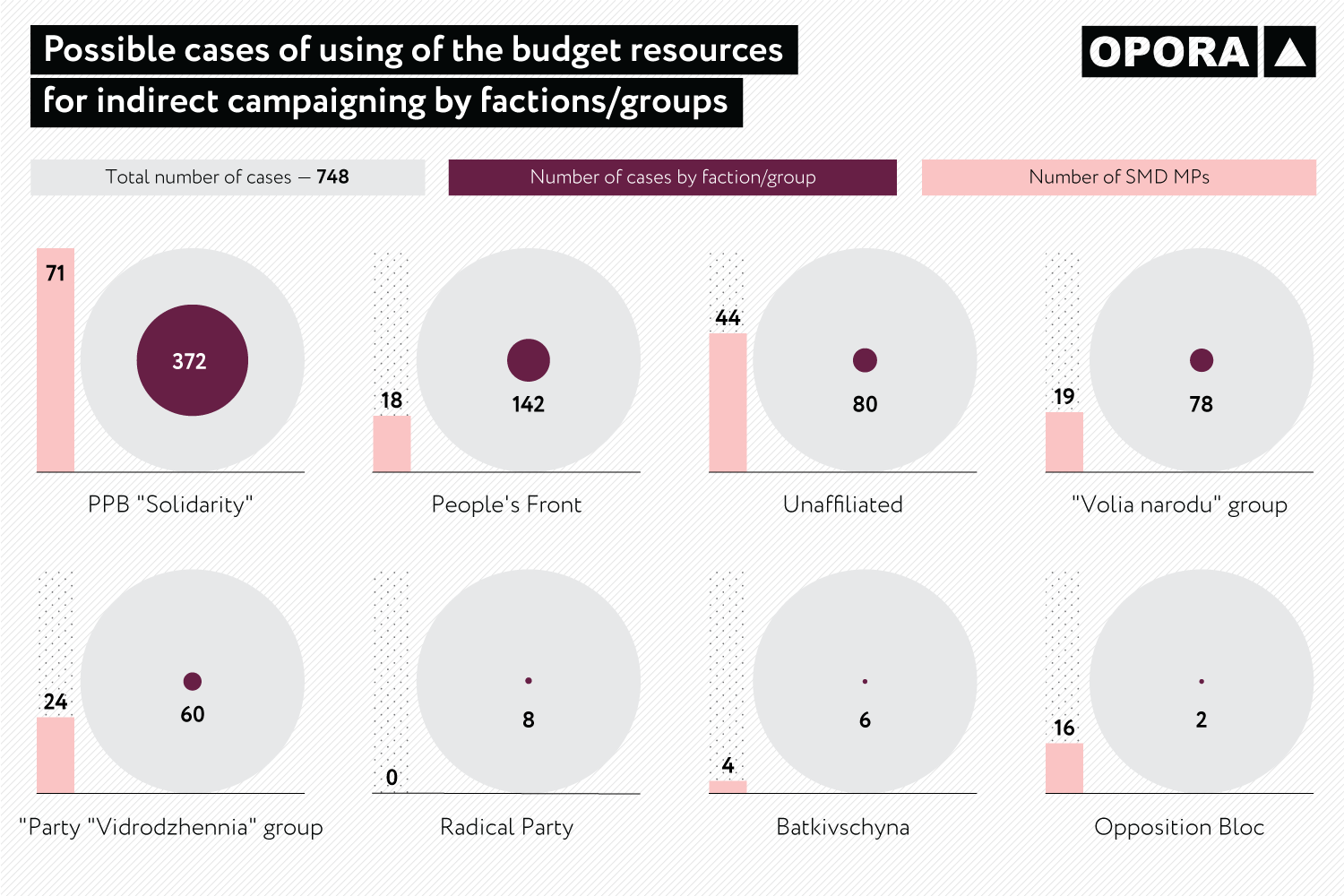
However the Civil Network OPORA notes that in the context of activities recorded referring to the factions and deputy groups in the Parliament, attention must be paid to the different numbers of MPs, particularly, majoritarian deputies, who are part of these unions in the Parliament. In addition, the various districts and regions of Ukraine actually get different funding and subventions from the State budget, which in turn can affect the number of recorded cases in the framework of the study.
Activities related to the alleged use of budget resources for indirect campaigning broken down to factions of deputies
| Faction / group | Number of deputies benefiting from indirect campaigning, as identified |
| “Petro Poroshenko Block” | 61 |
| “Popular Front” | 18 |
| “Non-faction” | 16 |
| “Revival Party” group | 15 |
| “Will of the People” group | 15 |
| OUU “Batkivshchyna” | 3 |
| “Opposition Block” | 2 |
| Oleh Liashko Radical Party | 1 |
As mentioned above, the number of deputies included in the faction may affect the number of recorded cases in the framework of monitoring. However, it must be noted that despite the lack of majoritarian deputies in the composition of the Radical Party faction, OPORA observers did take record of 8 cases related to the possible use of budget resources for indirect campaigning for the benefit of this political power. All of them were connected with the leader of the faction. Thus, on September, 29, Oleh Liashko visited Zaporozhzhia Oncology Center. During the event, the MP emphasized that funds for the installation of a linear accelerator at Zaporizhzhya Cancer Center started arriving upon his request, the tender for the procurement of equipment was conducted, and the linear accelerator will be opened in the following year. On the next day, September, 30, Oleh Liashko went to the Primorsky district of Mariupol, and along with the Mayor Vadym Boychenko, he handed out certificates for new apartments for 6 families of internally displaced persons from the occupied territories of the Donbas. Reconstruction of this house for housing purposes ran at the expense of subventions for socio-economic development.
Subject Areas of Cases
As part of the monitoring, the Civil Network OPORA also identified the subject areas covered by budget resources (in the context of targeting subventions for socio-economic development) allegedly used by deputies for indirect campaigning. In most cases, the subject areas of events concerned educational institutions (515 objects), less of them were from the area of utilities, improvement and infrastructure development (113), and medical facilities (111). In 95 cases, the allocated subventions were related to the socio-cultural sphere, while only 34 cases were connected with road surface repairs.
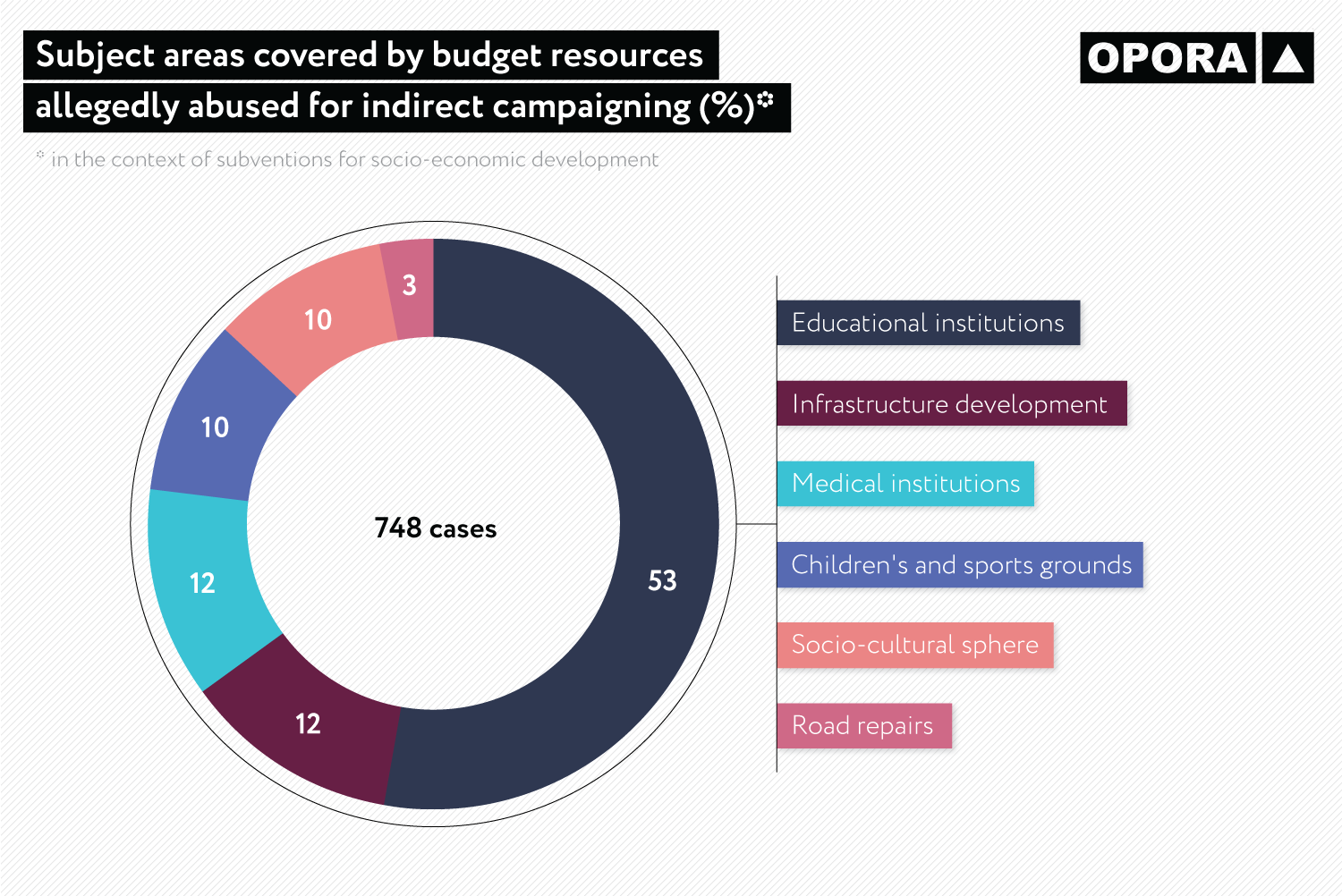
In the context of indirect campaigning cases recorded, 95 cases concerned already "traditional measures" for the opening or upgrading of children's and sports grounds.
Thus, on July, 16, the official website of the OUU “Batkivshchyna” posted a piece of news telling that “due to the request coming from the people’s deputy of Ukraine Yuriy Odarchenko, the Cabinet of Ministers allocated funds to construct a new sports ground with artificial turf in the village of Pravdyve.” The report also states that "In the past three years, thanks to the Kherson" Batkivshchyna" branch, three sports grounds were opened."
Besides, on September, 3, in Volodymyr-Volynskyi city, there was held the official opening ceremony of a sports ground with artificial turf. The event was attended by the people's deputy Ihor Huz (“People’s Front”). As the press service of the people's deputy later reported, "one million hryvnia – it is exactly so much money from the state budget attracted by the People's Deputy for the facility.” Articles with this information have later appeared in several Volhynia mass media.
Thus, the same as the subvention for the socio-economic development, cases of alleged use of budget funds for indirect campaigning were related to projects completely different in nature and subject areas: from installing playgrounds and providing the furniture to schools, to the reconstruction and upgrading of hospitals. Therefore, this is another fact that questions the effectiveness of sustainable socio-economic development of the regions due to subventions. Moreover, it reiterates the need to adopt a transparent mechanism for the evaluation and selection of the proposed projects, as well as to introduce the practice of the mid-term planning for the Government spending.
Possibilities and Recommendations
In general, during June to October, 2018, OPORA observers recorded 748 cases of alleged misuse of budget resources for indirect campaigning. According to our estimates, 560 of the cases were related to the subvention for social and economic development of individual territories. That is why we managed to relate these cases to specific sites of events. In general, within the scope of the study, we were able to establish 969 subventions (one case could be related to several objects) that could be used for indirect campaigning, with the total cost of 665 million hryvnia.
In this respect, the Civil Network OPORA reiterates the importance of changes in the mechanism of allocation of Government subventions, the need to increase the level of transparency and comprehensibility in allocation of funds, and the need to observe the principles of uniformity, consistency, and priority-oriented allocation of budgetary resources between the different regions of Ukraine. Therefore, OPORA developed the substantial recommendations which will be sent to all stakeholders, including the Cabinet of Ministers of Ukraine.
In addition, in order to prevent the misuse of budget resources for campaigning in favour of certain MPs and/or political parties, the Civil Network OPORA will continue tracing public activities that might be related to the misuse of state budget funds. Besides, the number of such state programs keeps increasing.
Thus, on November, 23, the Ukrainian Parliament approved the Budget for 2019. It now covers such new state programs that were not included in the previous year budget. In particular, it is the subvention to enhance quality in education (UAH 1.5 bln), the President Fund to support educational and scientific programs (UAH 1 bln), and a number of subventions to repair swimming pools, multifunctional playgrounds and sports facilities, with the total amount of over UAH 0.5 bln. Furthermore, it has already become traditional in the Ukrainian budget to provide almost UAH 5 bln for the socio-economic development of the territories. In this respect, it is important to provide both high quality utilization and targeted use of the funds, and also to prevent the use of the budget resources for the early indirect campaigning by prospective future electoral players.
